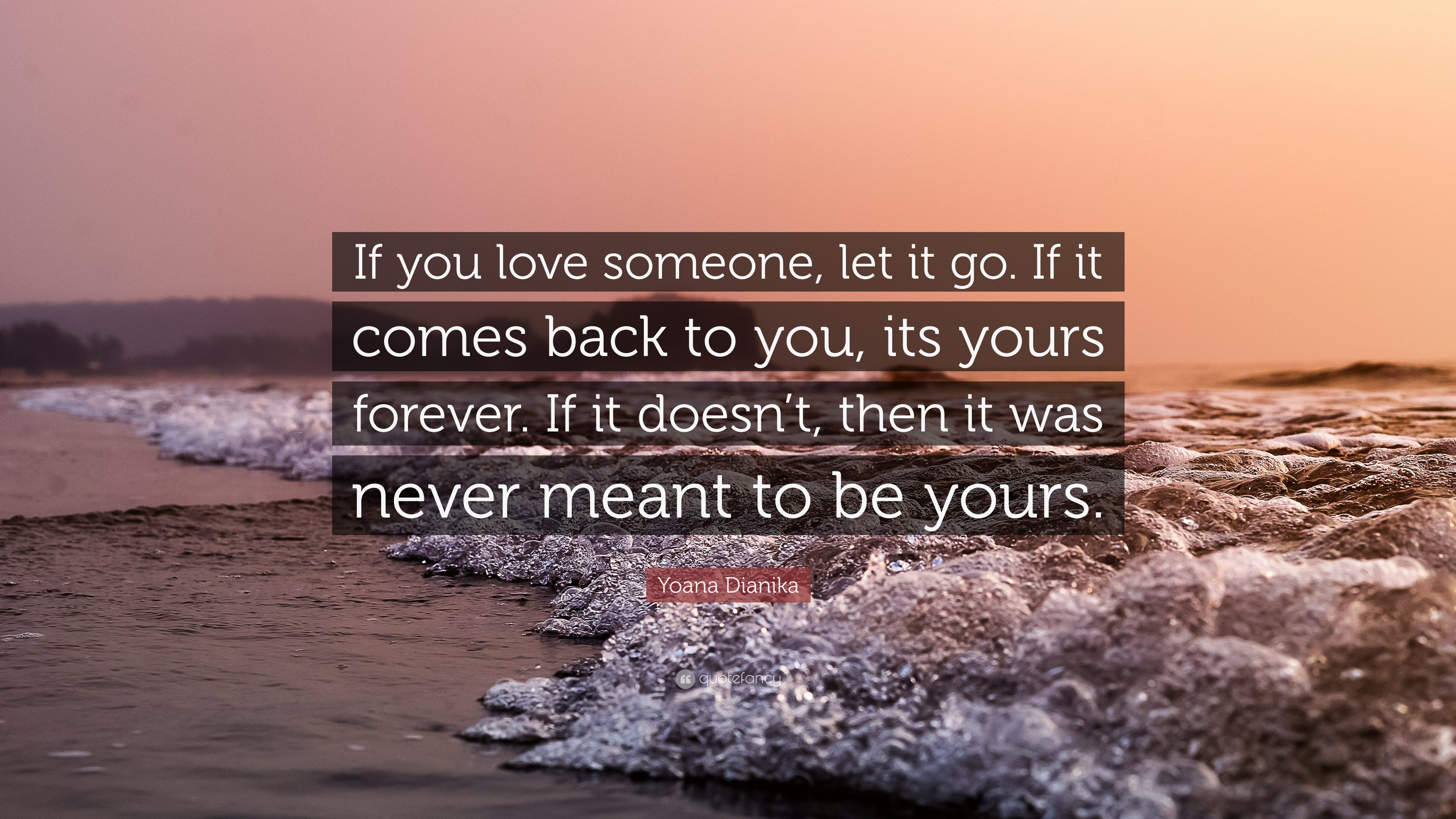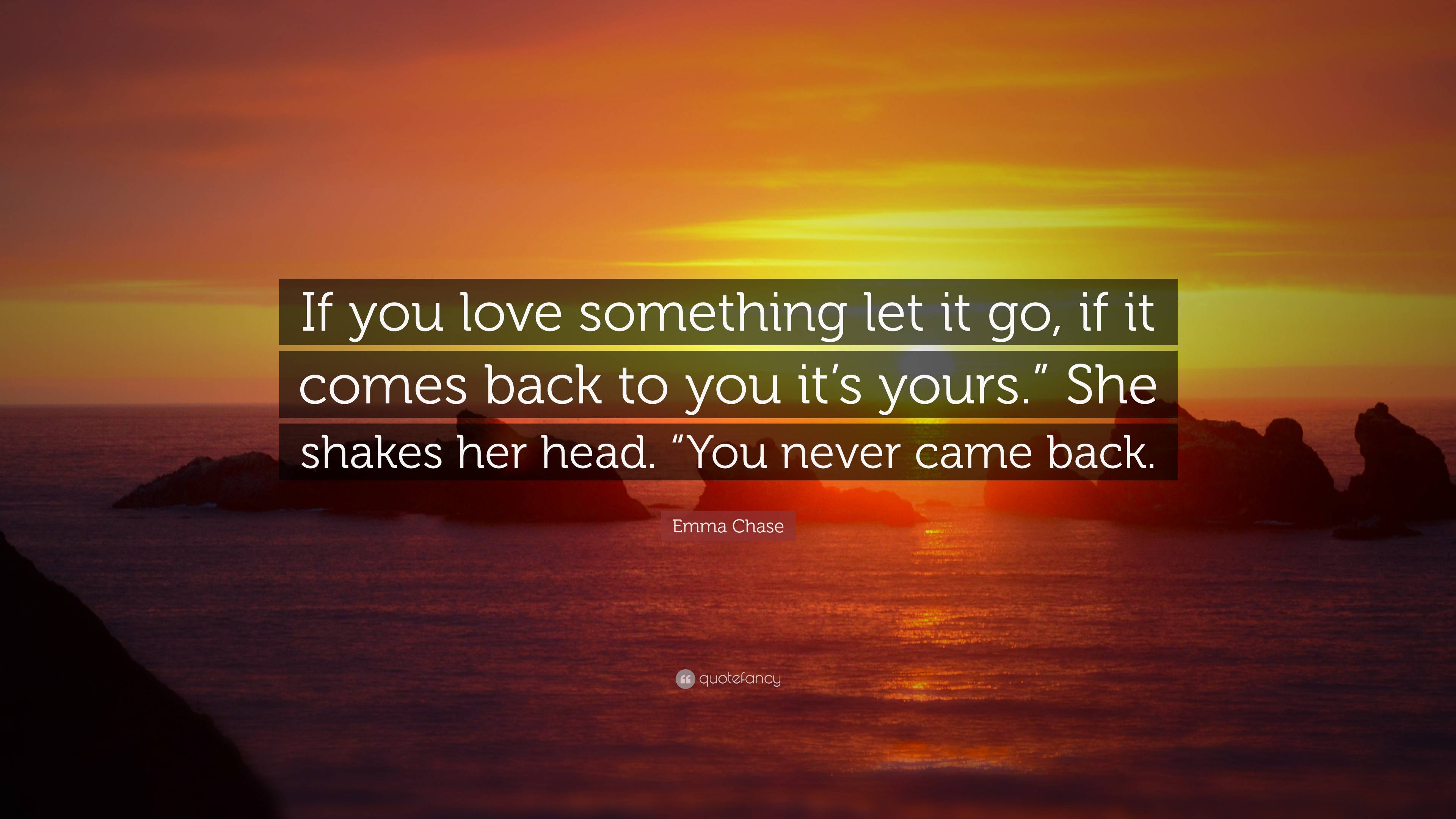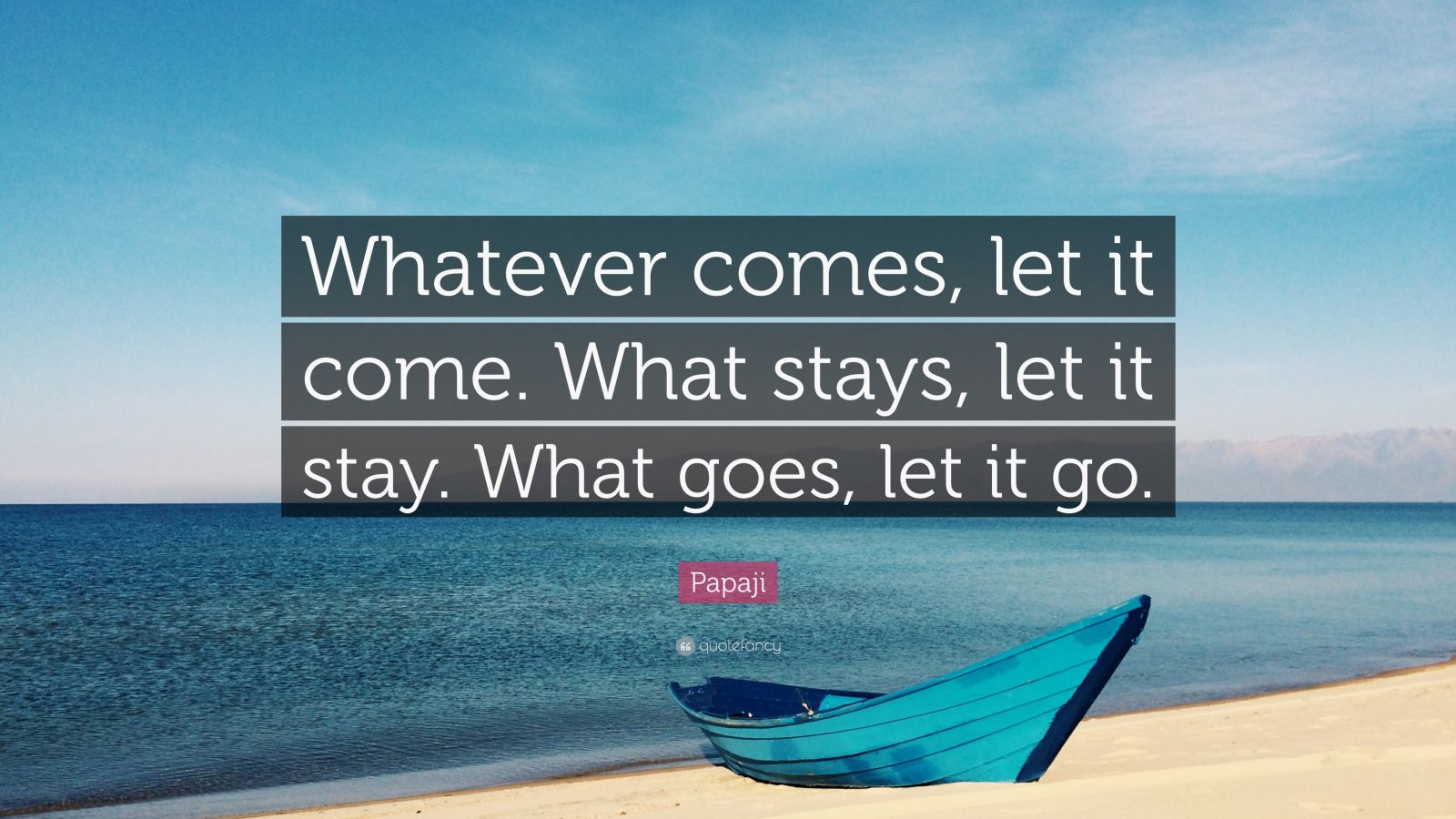Let It Go If It Comes Back - True Love's Test
There is a feeling we all know, a deep desire for something or someone to be truly ours, to stay close. It is a natural human inclination, this wish to hold on tight to what we care about most. Yet, a bit surprisingly, some wisdom suggests a different path, one that asks us to release our grip, to open our hands, and simply let things be. This idea, that setting something free might actually bring it closer, might seem a little backwards at first glance, but it holds a lot of truth for many people.
This thought, which appears in many old sayings, talks about a kind of faith. It asks us to trust that if something is truly meant to be a part of our life, it will find its way back, almost like magic. It is about giving up control, about letting go of expectations, and allowing life to unfold as it will. This can feel quite scary, especially when what we are letting go of holds such a big piece of our heart.
So, the question naturally comes up: what does it truly mean to let go of something you cherish, especially when it is a person? And what happens if that person, or that dream, does not return? This idea, "let it go if it comes back," is not just a pretty phrase; it is a way of looking at love, at connections, and at our own inner strength. It suggests that real affection does not need to hold on so tightly, that it can offer freedom and still remain strong.
- Who Is Running For Florida Governor 2026
- Dominatrix Songs
- Dr Jamie Kauffman
- Is River Ryan Married
- Taylor Swift Pictures Lover
Table of Contents
- What Does "Let It Go If It Comes Back" Truly Mean?
- The Heart of Letting Go - Why "Let It Go If It Comes Back"?
- Is There a Catch to "Let It Go If It Comes Back"?
- How Does Letting Go Feel?
- When Does "Let It Go If It Comes Back" Apply to Real Life?
- Can You Really Trust "Let It Go If It Comes Back"?
- Finding Freedom in Letting Go
What Does "Let It Go If It Comes Back" Truly Mean?
Many people have heard the saying, "If you want something very, very badly, let it go free. If it comes back to you, it is yours forever. If it does not, it was never yours to begin with." This sentiment, or a version of it, is pretty well known. It is a reminder to release things and have belief in a larger scheme of things. It is about giving up something you hold dear, with the hope that fate will step in and bring it back, if it is truly meant for you. This idea, in a way, challenges our usual instincts to cling to what we value.
There are many different forms of this idea, you know. One popular version, often linked to Douglas Horton, says, "If you love something, let it go free. If it does not come back, you never had it. If it comes back, love it forever." This really gets to the core of how we think about love and how we attach ourselves to things or people. At its heart, this idea speaks to the thought of letting go of what we expect and allowing people or situations to simply be. It is about understanding that genuine care is not about holding onto someone or something so tightly that they cannot breathe. It is about giving them room to be themselves, to make their own choices.
When you release what you care deeply about, it shows a lot of respect and trust. It is a quiet way of recognizing that you cannot force affection or connection. This means that if you love someone, you give them the space to choose, to wander, and to return if that is what they truly want. It is a powerful lesson, too, about the nature of affection itself. It suggests that true affection is not about having or owning someone; it is about freedom and letting others simply exist as they are, without trying to shape them into something else.
The Heart of Letting Go - Why "Let It Go If It Comes Back"?
The core of this idea is about trust, really. It is about trusting that what is meant for you will always find its way back, no matter where you are or what you have done. It suggests that certain connections will naturally move towards you, and you will not even have to lift a finger to make it happen. You just have to release it, accept that it is gone for a bit, focus on yourself, and if it comes back, it is truly yours. This can be a very hard thing to do, especially when your heart is involved.
Consider the feeling of holding onto something so tightly that it hurts, you know? The proverb suggests that making the effort to loosen your grip on a connection allows both people to grow on their own. And, if the affection is real, they will come back to the connection stronger than before. It is about letting people be free as individuals. If they return to you, then that is how you know it has always been genuine. This is what some people call "freedom love," where you let someone go and be free, not from a place of anger or sadness, but from a place of pure affection.
Leading with affection in these situations, like in conversations about space or future plans, is very important. If something is truly meant to be, it will return to you. This idea asks us to consider that real affection does not control or try to possess another person. It is about letting others be free to be who they are, completely. Releasing what you care deeply about shows a great deal of respect and trust. It is a way of recognizing that you simply cannot force a bond. This concept is a pretty big one, really, when you think about it, because it goes against our natural urge to hold on.
Is There a Catch to "Let It Go If It Comes Back"?
So, you might be wondering, if you love someone and you let them go, will they actually come back? And how do you even begin to let go of someone you care for so much? It is one thing to simply say, "if you love something, let it go," but it is a completely different thing to actually do it. Letting go of someone you love is not easy, not at all. It takes a lot of patience, a good bit of determination, and a lot of self-reflection. It is a process, and it can be a long one, too.
The idea of "letting go" can feel like a test, almost. Does it mean you should actively push away someone you love just to see if they would return? Or, is it more about not holding onto someone you care about when they choose to move away? This is a really important distinction, actually. The wisdom of "let it go if it comes back" is not about testing someone's loyalty by pushing them away. It is about recognizing when someone wants to leave, or needs space, and allowing them that freedom without trying to stop them or make them feel bad. It is about releasing your own need to control the situation.
Sometimes, people interpret this idea as a guarantee that if you let someone go, they will definitely come back. And yes, it does suggest that, to a point. But it is not a magic spell, you know? It is more about the nature of true connection. If a connection is truly meant to be, it has a way of finding its path. If it is not, then no amount of holding on will make it so. This can be a hard pill to swallow, but it is a very real part of life. It asks us to trust in something beyond our immediate control, which can be quite a challenge for many of us.
How Does Letting Go Feel?
Letting go can feel like a very strange mix of emotions. There is often a sense of loss, a kind of emptiness where something once was. But there can also be a quiet sense of peace, a feeling of lightness that comes from releasing a burden. It is like that moment when you cut an umbilical cord, or when parents hand over car keys to their grown children; it is a moment of separation, but also a moment of new beginnings and freedom for everyone involved. They might fly away from the nest, but if you let them go freely and with good wishes, they often find their way back, or at least keep a connection.
Consider the example of a high school love, for instance. You fell in love, and then he met someone else who was homeless and he felt sorry for her. He moved her in with him and his parents while he was still with you, and you did not know, but you had a hunch because you were not seeing each other as much. So, you let him go, but you still met up with each other when you could. You loved him very much, so every part of you wanted him back. This situation, you know, really shows how hard it is to let go when your heart is so deeply involved. You might keep meeting up, hoping he will return, but the core idea is about truly releasing that grip.
The saying, "If it comes back, it is yours. If not, it was never meant to be," applies here, too. So, if you let someone go, they will return if that is your destiny, some people believe. For those of us who do not believe everything is already decided, it is more about the quality of the connection. It is about whether the connection is strong enough, or real enough, to withstand separation and still find its way back. It is a very personal journey, this act of letting go, and it often comes with a lot of thought and feeling.
When Does "Let It Go If It Comes Back" Apply to Real Life?
This idea applies to many different parts of life, not just romantic connections. It can be about a dream you are holding onto too tightly, a job you are clinging to, or even an old habit that is no longer serving you. The core message is that if you love something so much, you should let it go. If it returns, it was meant to be. If it does not, it never truly was. Albert Schweitzer, a very thoughtful person, has been linked to this idea, suggesting its deep roots in human thought. It is a pretty universal concept, actually, that speaks to how we relate to everything around us.
Think about it like this: if a dog is so determined to break free, you might just have to let it go. It is a bit like a boyfriend who wants to break up. We all know the old saying: if you set someone free, and he never returns, then he was never truly yours. This speaks to a kind of wisdom about freedom and personal choice. It suggests that trying to force someone or something to stay when they want to go is not only pointless but also goes against the nature of true connection. It is about allowing space, allowing choice, and trusting in what comes next.
The concept of "freedom love" is really important here. It is about letting people go and be free, and this action comes from a place of genuine affection, never from anger or pity. You lead with affection in these moments, and if it is meant to be, it will return to you. This is a very different way of approaching relationships than what we might be used to, where we often try to hold on very tightly. It requires a lot of inner work, a lot of self-awareness, and a willingness to face uncertainty. It is a practice, really, more than a one-time event.
Can You Really Trust "Let It Go If It Comes Back"?
The question of trust is a big one here. Can you truly believe that if you release something, it will return if it is meant for you? Richard Bach, a well-known writer, put it this way: "If you love someone, set them free. If they come back, they are yours; if they do not, they never were." He captures a very deep truth about what love is and the freedom it needs to thrive. It is about understanding that true affection does not require control or possession. It asks us to allow others to be free to be themselves, completely and without reservation.
Since the first time many people came across the saying, "If you love someone, let them go. If they come back, they are yours forever," it has sparked many thoughts. Does it mean you should actively push away someone you love to test if they would return? Or, is it more about not holding onto someone you love when they choose to move away? The answer, many believe, is the latter. It is about respecting another person's path, even if that path temporarily leads them away from you. It is about having faith in the strength of the bond, if it is a true one.
This idea is not about being passive, either. It is about focusing on yourself, growing, and being open to what life brings. If you want something badly enough, you must let it go free. If it returns to you, it is yours. If it does not, you really never had it anyway. This can be a tough lesson, a little bit like realizing you cannot force a river to flow uphill. You must let go of the wheels, or you might hurt yourself. Sometimes, you cannot see the hurt in someone else's eyes, and it is just as well, for it might be a hurt you would not have understood. This idea asks for a great deal of acceptance and a willingness to surrender to what is.
Finding Freedom in Letting Go
There is a profound sense of freedom that comes from truly embracing the idea of "let it go if it comes back." It is a freedom from the burden of trying to control what cannot be controlled. It is a freedom from the constant worry and anxiety that comes with holding on too tightly. When you genuinely release something or someone, you are also releasing yourself from the emotional weight that comes with trying to force an outcome. This can be a very liberating experience, actually, opening up space for new possibilities.
This path of letting go also encourages personal growth. When you are not constantly focused on holding onto someone else, you have more energy and attention to give to yourself. You can work on becoming a stronger, more complete person. And, as the saying suggests, if a connection is meant to be, this personal growth will only make the eventual return of that person or thing even stronger and more meaningful. It is a journey of self-discovery, in a way, that happens alongside the act of releasing what you care about.
Ultimately, this wisdom is about a deeper kind of trust – trust in the universe, trust in the nature of true affection, and perhaps most importantly, trust in yourself. It is about understanding that some things are meant to flow freely, and that true connections do not need chains to bind them. They exist because they are real, because they are chosen, and because they are meant to be. This perspective, you know, can bring a lot of peace to situations that might otherwise feel very difficult and full of pain. It is a different way of looking at love, one that values freedom and belief above all else.
- Comfy Winter Pants
- Judy Trammell Dallas Cowboy Cheerleader
- Everlane Skirt
- Sheds Houston
- Pics Of The Riots

Yoana Dianika Quote: “If you love someone, let it go. If it comes back

Emma Chase Quote: “If you love something let it go, if it comes back to

Papaji Quote: “Whatever comes, let it come, what stays let stay, what